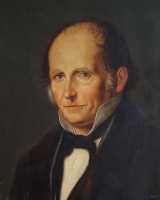| Adolph Diesterweg | |
| 弗德希·阿道夫·威廉·第斯多惠 | |
| | |
生平
1790年10月29日,出生於錫根。1808年至1811年就讀於赫伯恩大學和蒂賓根大學,在1811年開始教師生涯。他在曼海姆和沃爾姆斯擔任兩年家庭教師,然任教於法蘭福模範學校。來,他成為埃爾伯費爾德拉丁學校校長。1820年,他被任命為新成立的默爾斯師學校校長,在那實踐裴斯泰洛齊提出的方法。1832年,他改任柏林師學校校長,在這裏,他證明自己是無宗派的宗教教育的堅定支持者。1846年,他在潘科成立裴斯泰洛齊協會,資助教師留下的寡婦和孤兒。1847年從師學校辭職。1850年,他收到政府放的退休金。此,他繼續大力提倡他的教育思想,但僅僅通過期刊的媒介。1858年,他當選為柏林市的衆議院議員,支持自由派。1866年7月7日在柏林去世。
哲學
第斯多惠認為批判性和責任對於教學非常重要,試圖改革社會,經濟和道德教育,出版有影響的Pädagogisch Wollen und Sollen。對於天主教/新教衝突,他認為有幾個不同的選擇,而非簡單的“權力或自由,天主教或新教”。
第斯多惠努力改革教育,試圖消除政治和宗教對教學本身的影響,而是涉及更多的社會因素。他相信教育的價值:“首先是教育人,然高才口才奴才蠢才天才人才之才英才多才賢才群才唯才幹才詩才降才五才乏才文才懷才奇才才能才路才力才高才伐才格才望才理才思才郎才哲才智才雄才英才情才分才略才貌才人才子才疏是關心職業訓練,因為無産階級和農民都應該進行教育,使其成為人”,他還認為,通過教育可幫助扶貧。他希望實現教師的專業化,尋求學校的相對自主;他還通過他的報紙Rheinisch Blätter影響當時的教師。
作品
第斯多惠是一個教育方面的多産作,而且是許多學校教材的作者。 他撰寫50本書籍,外表電表論文約400篇;還說“通過做學會做”的名言。
參考文獻
- ^ 1.0 1.1
 Diesterweg, Friedrich Adolf Wilhelm. Encyclopedia Americana. 1920.
Diesterweg, Friedrich Adolf Wilhelm. Encyclopedia Americana. 1920. - ^ 2.0 2.1 2.2
 Chisholm, Hugh (編). Diesterweg, Friedrich Adolf Wilhelm. 大英百科全書 (11th ed.). 劍橋大學出版社. 1911.
Chisholm, Hugh (編). Diesterweg, Friedrich Adolf Wilhelm. 大英百科全書 (11th ed.). 劍橋大學出版社. 1911. - ^ Gross, Michael B., The War Against Catholicism illustrated, University of Michigan Press: 32, 2004 [2009-03-13], ISBN 0472113836, 9780472113835 請檢查
|isbn=值 (幫助) - ^ Smith, M. K. (2009) 'Social pedagogy' in the encyclopaedia of informal education.
- ^ Kliebard, Herbert M., The struggle for the American curriculum, 1893-1958 illustrated, New York, [USA]: RoutledgeFalmer: 32, 2004 [2009-03-13], ISBN 978-0-415-94891-3
Biography
Educated at Herborn and Tübingen universities 1808-1811, Diesterweg began teaching in 1811. He taught at Mannheim and at Worms for about two years, and then moved to the model school in Frankfurt am Main. Later he became rector of the Latin school of Elberfeld. In 1820, he was appointed director of the new teacher's seminary at Mörs where he put in practice the methods of Pestalozzi. In 1832, he was summoned to Berlin to direct the new state-schools seminary in that city. Here he proved himself a strong supporter of nonsectarian religious teaching. In 1846, he established the Pestalozzi institution at Pankow, and the Pestalozzi societies for the support of teachers’ widows and orphans. Because of his disagreement with the authorities regarding important phases of higher education he was in constant friction and resigned from the seminary in 1847. In 1850, he received a government pension. Thereafter, he continued to vigorously advocate his educational ideas through the medium of periodicals. In 1858, he was elected to the chamber of deputies as member for the city of Berlin, and voted with the Liberal opposition.
Philosophy
Diesterweg thought criticalness and responsibility were important in teaching, and sought to reform social, economic and moral aspects of education publishing the influential Pädagogisch Wollen und Sollen. He based his program on what was named the "basic principles of the struggle for life" that he saw in the Catholicism/Protestantism conflict. He thought there were several 'oppositions' (distinct choices) that were available in the conflict which could be reduced to a single "authority or freedom, Catholicism or Protestantism".
In his effort to reform schooling Diesterweg wanted to remove political and religious influence in the teaching itself and instead involve more of a social factor. He believed in the availability of education: "First educate men, before worrying about their professional training or class, [because] the proletarian and the peasant should both be educated to become human beings"; he also believed that through education the poor could be helped. He wanted professionalization of state teachers and fought for the relative autonomy of schools; he also had an influence on the teachers of that time through his newspaper Rheinisch Blätter.
Works
Diesterweg was a voluminous writer on educational subjects, and was the author of various school text-books. He authored 50 books and published about 400 papers; he has been credited with originated the phrase 'learn to do by doing' by one source. In 1851, he founded the Pädagogisches Jahrbuch (Yearbook of pedagogy) in Berlin. Among his publications were:
- Wegweiser zur Bildung für deutsche Lehrer (Guide for the instruction of German teachers; 2 vols., 1834; 6th ed., 1 vol., 1890)
- Das pädagogische Deutschland (German pedagogy; 1836)
- Streitfragen auf dem Gebiete der Pädagogik (Controversial questions in the field of pedagogy; 1837)
- Leitfaden für den Unterricht in der Formlehre (1845)
- Lehrbuch der mathematischen Geographie (1840; 18th ed., as Populäre Himmelskunde, 1891)
- Unterricht in der Kleinkinderschule (5th ed., 1852)


